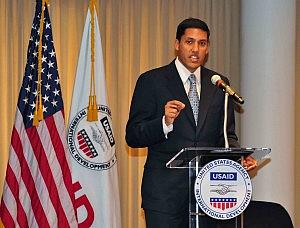USAID Focused on Improving Technology Delivery from “Bench to Bush”
Rajiv Shah/ Photo source USAID
While speaking at the National Institutes of Health on Tuesday, USAID Administrator Rajiv Shah (left, photo source USAID) told the audience of scientists how the development agency would support the creation of new innovations and their delivery to improve the health of the world's neediest populations.
After briefly describing President Barack Obama's six-year $63 billion Global Health Initiative (GHI) and its goals of building a more coordinated response, Shah shifted away from health systems strengthening, and disease by disease, described how new technologies are needed to alleviate global suffering.
"Vaccines are the best public health investment we can make," Shah said. "The best hope for eliminating malaria, TB and HIV/AIDs depends on their development and widespread use."
Shah referenced the massive constraints to effective delivery in developing countries: poor infrastructure, understaffed facilities, and underfunded health ministries. He said we "build a new global health system that better connects NIH labs to USAID field sites" to enhance the delivery of new technologies from "bench to bush." Besides empowering community health workers to reach the farthest, neediest corners of the poorest countries, however, Shah did not describe what such a delivery system would look like and how it would work.
Shah cautioned that reducing commitments in any area would lead to the reversal of great progress made over the last couple decades, especially in malaria. He quoted Secretary of State Hillary Clinton to make a case for why the United States should invest in global health: Poor health undermines social stability in poor countries and ultimately threatens our own national security.
"The global health community is now poised to remove malaria as a major public health problem across subSaharan Africa," Shah said. Reducing investments now, he said, would lead to the reversal of decades of progress.
Regarding tuberculosis, "continuing to do more of the same will not work to turn the tide," Shah said. Scientists need to develop better, inexpensive diagnostics and shorter treatment regimens to reduce resistance and improve outcomes.
For HIV, Shah's comments geared mostly toward expanding evidenced-based prevention strategies. Along with behavioral education campaigns, microbicide gels, circumcision and pre-exposure treatment offer promising strategies. "We need to act with greater urgency to achieve results," he said.
Following Shah's speech, a Purdue University professor who grew up in Sudan addressed him, saying she was grateful for the lifesaving vaccines and malaria treatments she received as a child, but the problems she see being unaddressed now are noncommunicable diseases. Her sisters and friends are dying for lack of breast and cervical cancer treatment. "The international organizations and governments in Africa are not admitting that cancer is a problem," she said.
Shah empathized with her and gave a nod to the effort led by Harvard School of Public Health Dean Julio Frenk to raise awareness about the lack of treatment for cancer and other noncommunicable diseases. But, he said, USAID and the GHI would continue focusing on cost-effective solutions to reduce the burden of infectious diseases. Succeeding in that area, he said, would free up resources for "the next frontier."

